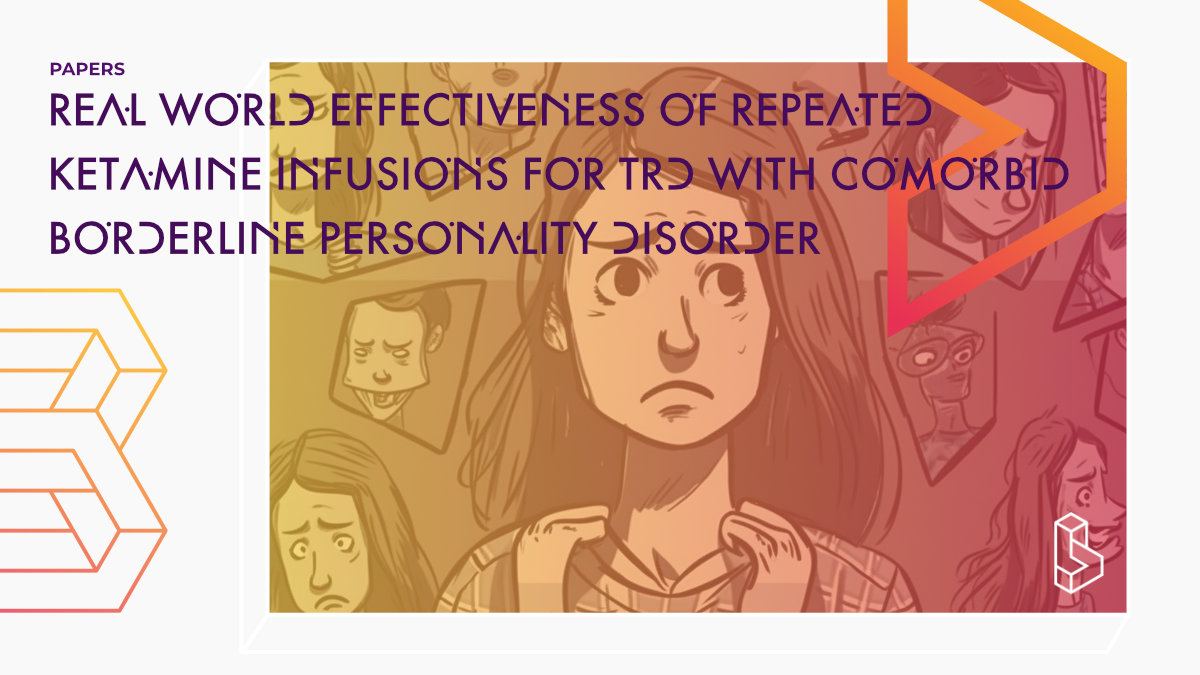This retrospective analysis (n=100) of the effectiveness of ketamine (35mg/70kg) for borderline personality disorder (BPD) in those with treatment-resistant depression (TRD) finds that intravenous ketamine significantly reduces symptoms of depression, borderline personality, suicidality, and anxiety in patients with comorbid BPD and TRD. Both BPD-positive and BPD-negative groups showed significant improvements in the primary outcome measures, with no significant difference between groups.
Abstract
“Borderline personality disorder (BPD) has high rates of comorbidity with mood disorders, including treatment-resistant depression (TRD). Comorbidity of BPD with depression is associated with poorer response to antidepressants. Intravenous ketamine is a novel treatment for TRD that has not been specifically evaluated in patients with comorbid BPD. In this retrospective analysis of data collected from participants who received care at the Canadian Rapid Treatment Centre of Excellence (CRTCE; Braxia Health; ClinicalTrials.gov: NCT04209296), we evaluated the effectiveness of intravenous ketamine in a TRD population with comorbid BPD (N=100; n=50 BPD-positive compared with n=50 BPD-negative). Participants were administered four doses of intravenous ketamine (0.5-0.75mg/kg over 40 minutes) over two weeks. The primary outcome measures were changes in depressive symptom severity (as measured by Quick Inventory of Depressive Symptomatology–Self Report 16-item (QIDS-SR16)) and borderline symptom severity (as measured by Borderline Symptom List 23-item (BSL-23)). Both BPD-positive and BPD-negative groups improved significantly on the QIDS-SR16, QIDS-SR16 suicide ideation item, anxiety, and functionality scales with large effect sizes. There was no significant difference between groups. The BPD-positive group exhibited significant reduction of 0.64 on BSL-23 scores and a significant reduction of 5.95 on QIDS-SR16 scores. Patients with TRD and comorbid BPD receiving ketamine exhibited a significant reduction in symptoms of depression, borderline personality, suicidality, and anxiety.”
Authors: Kevork Danayan, Noah Chisamore, Nelson B. Rodrigues, Joshua D. Di Vincenzo, Shakila Meshkat, Zoe Doyle, Rodrigo Mansur, Lee Phan, Farhan Fancy, Edmond Chau, Aniqa Tabassum, Kevin Kratiuk, Anil Arekapudi, Kayla M. Teopiz, Roger S. McIntyre, Joshua D. Rosenblat
Find this paper
https://doi.org/10.1016/j.psychres.2023.115133
Paywall | Google Scholar | Backup | 🕊
Study details
Compounds studied
Ketamine
Topics studied
Treatment-Resistant Depression
Depression
Study characteristics
Open-Label
Participants
100
Humans
Institutes
Institutes associated with this publication
Braxia ScientificBraxia Scientific Corp (previously Champignon Brands and Apotheosis Scientific) is one of the for-profit companies developing therapies in conjunction with psychedelics. In its short history, it has acquired a psilocybin research firm Tassili Life Sciences, a mushroom cultivator (Artisan Growers), and has recently started offering esketamine treatments for MDD.
Linked Research Papers
Notable research papers that build on or are influenced by this paper
Real-world effectiveness of repeated intravenous ketamine infusions for treatment-resistant depression in transitional age youthThis retrospective analysis (n=52) investigates the efficacy of ketamine (35-52mg/70kg; 4x) for treating treatment-resistant depression (TRD) in transitional age youth (TAY; age 18-25), comparing them with matched adults. The study finds significant reductions in depression, anxiety, and suicidal ideation in the TAY group, with effect sizes indicative of clinically meaningful improvements. The benefits and safety outcomes in the TAY group were comparable to the GA group, suggesting ketamine can be equally effective and well-tolerated in younger patients with TRD.
Linked Clinical Trial
Chart Review of Patients Undergoing Ketamine InfusionsThis retrospective analysis aims to look at past data in order to further develop our understanding of ketamine in the use of psychiatry.

